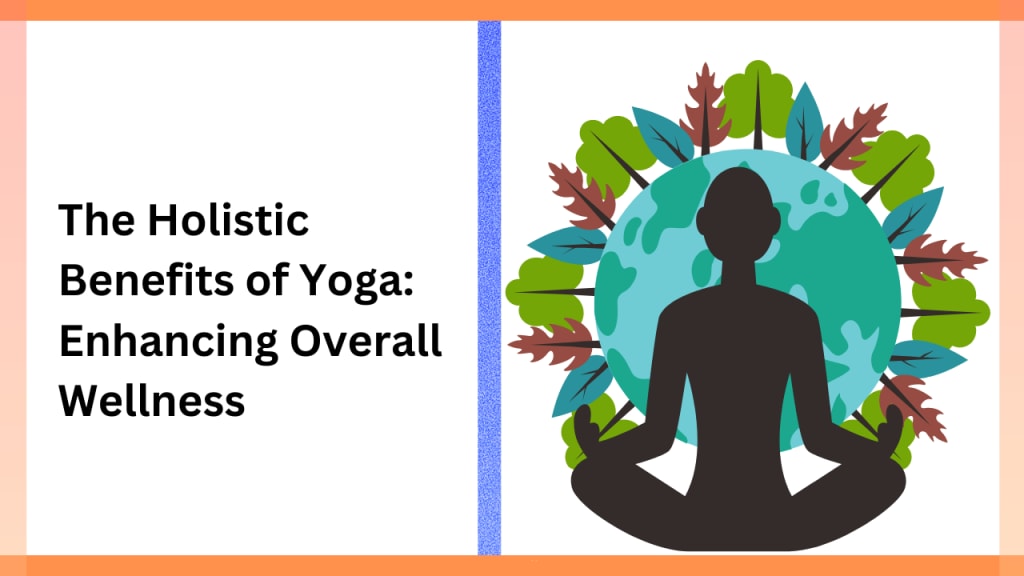Transformative Power of Yoga: A Holistic Approach to Stress Management
Yoga has been a part of the Indian culture for several ages. In yoga, it is believed that our body and mind are interdependent.

Thus, this ancient Indian culture tries to unite body, mind and spirit. This is what differentiated yoga from other normal exercises. Yoga is not only a physical exercise, it is actually a science of living a healthy life.
Practicing yoga helps you stay active, healthy and improves the concentration level. Not only in India, the benefits of yoga are now recognized globally. In fact, yoga can now be claimed as one of the trending things in the world. May be this is because of its ability to reduce stress.
In today's fast-paced world, stress has become a common denominator for many individuals. The demands of work, personal relationships, and the constant influx of information can overwhelm even the most resilient individuals. Stress, often regarded as a natural response to life's challenges, can manifest in various forms, such as physical tension, anxiety, sleep disturbances, and even chronic health issues.
Prolonged exposure to stressors without proper coping mechanisms can significantly impact our physical and mental health well-being, thus leading to burnout, depression, and a diminished quality of life. Recognizing the detrimental effects of stress, it has become crucial to adopt strategies that address its root causes and promote resilience.
As a result, people are actively seeking effective stress management techniques that not only provide temporary relief, but foster long-term well-being. In this regard, yoga has emerged as a holistic practice that promotes physical, mental, and emotional balance, thus offering a profound impact on stress management.
Various research and education centres in India are also working with the government to reinforce the message - yoga is for wellness.
Yoga as a Stress Management Tool
Yoga, an ancient practice originating in India, encompasses physical postures (asanas), breathing techniques (pranayama), meditation, and mindfulness. Its integrative nature allows individuals to cultivate a sense of balance and harmony within themselves and the world around them.
Here are some of the key ways in which yoga can effectively manages stress:
Physical Well-being: Regular practice of yoga asanas improves flexibility, strength, and overall physical health. The gentle stretching and movement sequences release muscular tension, reduce chronic pain, and enhance blood circulation. Physical activity triggers the release of endorphins, commonly known as "feel-good" hormones, promoting a sense of well-being and relaxation.
Breath Awareness and Pranayama: Conscious breathing techniques, a core aspect of yoga activate the parasympathetic nervous system responsible for the body's relaxation response. Deep and rhythmic breathing patterns reduce stress hormone levels, lower heart rate, and induce a calm state of mind. Techniques such as alternate nostril breathing (nadi shodhana) and abdominal breathing (diaphragmatic breathing) have been found to significantly reduce stress and anxiety levels.
Mind-Body Connection: Yoga encourages individuals to develop a deeper connection between the mind and body. Through mindful movement and focused awareness, practitioners learn to observe their thoughts and emotions without judgment. This increased self-awareness promotes emotional stability and resilience, allowing individuals to respond to stressful situations with greater clarity and composure.
Meditation and Mindfulness: The practice of meditation cultivates a calm and centred state of mind by quieting mental chatter and fostering present-moment awareness. Regular meditation enhances attention span, improves emotional regulation, and reduces the impact of stress on the body. Mindfulness, an integral part of yoga involves paying attention to the present moment with openness and acceptance. By cultivating mindfulness, individuals can break free from automatic stress responses and cultivate a greater sense of peace.
Stress Reduction on a Neurobiological Level: Scientific research has shown that regular yoga practice positively affects the brain and nervous system. Studies using brain imaging techniques have demonstrated that yoga reduces activity in the amygdala, the brain's stress centre, while increasing activity in the prefrontal cortex responsible for cognitive control and emotional regulation. These changes in brain activity contribute to a decreased stress response and improved overall well-being.
How to begin the journey of stress management through yoga?
The best part about yoga is you don’t need any prior experience or accessories other than yourself to begin with. If you have a yoga mat that is great, but otherwise you can sit on a towel or simply on the floor. It can be done in the comfortable corner of your house or amidst nature. The outdoor environment during the yoga practice can enhance your positive energy.
The world acceptance of yoga as a powerful antidote to stress has emerged at a critical time than ever before. The extraordinary amount of stress that human being has witnessed in the past two years has placed an enormous effect on their physical and mental health. Yoga can become crucial in providing relief to people of every age group and sector.
But to gain the best result, it is significant to learn the safe and effective practices appropriate for the individual. While the well to do class can approach qualified and trained yoga teachers and begin their journey, the mass at large cannot. There are numerous free yoga videos and tutorials available online following which they can start practicing at home. Institutes of Public Health in India should come forward to spread awareness about how yoga can aid in mental and physical well-being and help to lead a harmonious life so that every individual incorporate Yoga in their lifestyle.
About the Creator
I3TK
International Institute of Innovation and Technology (I3TK) is based in New Town, Kolkata in the State of West Bengal, India. For more details, visit: https://i3tk.org/
Enjoyed the story? Support the Creator.
Subscribe for free to receive all their stories in your feed. You could also pledge your support or give them a one-off tip, letting them know you appreciate their work.






Comments
There are no comments for this story
Be the first to respond and start the conversation.